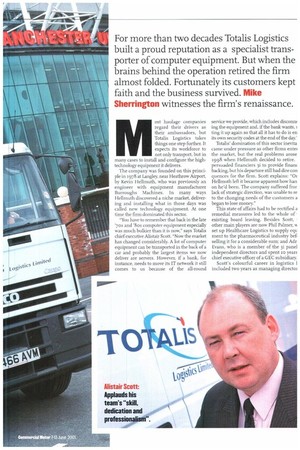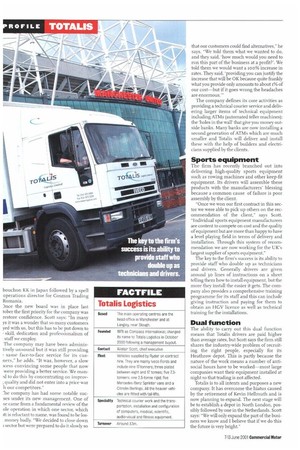For more than two decades Totalis Logistics built a proud
Page 39

Page 40

If you've noticed an error in this article please click here to report it so we can fix it.
reputation as a specialist transporter of computer equipment. But when the brains behind the operation retired the firm almost folded. Fortunately its customers kept faith and the business survived. Mike Sherrington witnesses the firm's renaissance.
1111 ost haulage companies regard their drivers as their ambassadors, but Totalis Logistics takes things one step further. It expects its workforce to not only transport, but in many cases to install and configure the hightechnology equipment it delivers.
The company was founded on this principle in 1978 at Langley, near Heathrow Airport, by Kevin Hellmuth, who was previously an engineer with equipment manufacturer Burroughs Machines. In many ways Hellmuth discovered a niche market, delivering and installing what in those days was called new technology equipment. At one time the firm dominated this sector.
"You have to remember that back in the late '7os and '8os computer equipment especially was much bulkier than it is now," says Totalis chief executive Alistair Scott. "Now the market has changed considerably. A lot of computer equipment can be transported in the back of a car and probably the largest items we now deliver are servers. However, if a bank, for instance, needs to move its IT network it still comes to us because of the all-round service we provide, which includes disconn( ing the equipment and, if the bank wants, E ting it up again so that all it has to do is en its own security codes at the end of the day.'
Totalis' domination of this sector inevita came under pressure as other firms entei the market, but the real problems arose 1998 when Hellmuth decided to retire. persuaded financiers 3i to provide finan( backing, but his departure still had dire con quences for the firm. Scott explains: "Or Hellmuth left it became apparent how han on he'd been. The company suffered fror lack of strategic direction, was unable to re to the changing needs of the customers a began to lose money."
This state of affairs had to be rectified a remedial measures led to the whole of existing board leaving. Besides Scott, other main players are now Phil Palmer, vs set up Healthcare Logistics to supply cry.: ment to the pharmaceutical industry bef selling it for a considerable sum; and Adr Evans, who is a member of the 3i panel independent directors and spent ro years chief executive officer of a GEC subsidiary.
Scott's colourful career in logistics I included two years as managing directoi bouchon KK in Japan followed by a spell operations director for Cosmos Trading Romania.
)nce the new board was in place last tober the first priority for the company was restore confidence. Scott says: "In many ys it was a wonder that so many customers yed with us, but this has to be put down to skill, dedication and professionalism of staff we employ.
The company may have been adrninis Lively unsound but it was still providing same face-to-face service for its cusners," he adds. "It was, however, a slow )cess convincing some people that now were providing a better service. We mantd to do this by concentrating on improv, quality and did not enter into a price war h our competitors."
he company has had some notable sucses under its new management. One of se came from a fundamental review of the ole operation in which one sector, which ill is reluctant to name, was found to be los, money badly. We decided to close down sector but were prepared to do it slowly so
that our customers could find alternatives," he says. "We told them what we wanted to do, and they said, 'how much would you need to run this part of the business at a profit?'. We told them we would want a r00% increase in rates. They said, 'providing you can justify the increase that will be OK because quite frankly what you provide only amounts to about i% of our cost—but if it goes wrong the headaches are enormous.–
The company defines its core activities as providing a technical courier service and delivering larger items of technical equipment including ATMs (automated teller machines); the 'holes in the wall' that give you money outside banks. Many banks are now installing a second generation of ATMs which are much smaller and Totalis will deliver and install these with the help of builders and electricians supplied by the clients.
Sports equipment
The firm has recently branched out into delivering high-quality sports equipment such as rowing machines and other keep-fit equipment. Its drivers will assemble these products with the manufacturers' blessing because a common cause of failure is poor assembly by the client.
"Once we won our first contract in this sector we were able to pick up others on the recommendation of the client," says Scott. "Individual sports equipment manufacturers are content to compete on cost and the quality of equipment but are more than happy to have a level playing field in terms of delivery and installation. Through this system of recommendation we are now working for the UK's largest supplier of sports equipment."
The key to the firm's success is its ability to provide staff who double up as technicians and drivers. Generally drivers are given around 3o lines of instructions on a sheet telling them how to install equipment, but the more they install the easier it gets. The company also provides a comprehensive training programme for its staff and this can include giving instruction and paying for them to obtain an HGV licence as well as technical training for the installations.
Dual function
The ability to carry out this dual function means that Totalis drivers are paid higher than average rates, but Scott says the firm still shares the industry-wide problem of recruiting the right people, especially for its Heathrow depot. This is partly because the nature of the work means a number of antisocial hours have to be worked most large companies want their equipment installed at night so that trading is not affected.
Totalis is to all intents and purposes a new company. It has overcome the hiatus caused by the retirement of Kevin Hellmuth and is now planning to expand. The next stage will be to establish a depot in North London, possibly followed by one in the Netherlands. Scott says: "We will only expand the part of the business we know and I believe that if we do this the future is very bright."




































































































